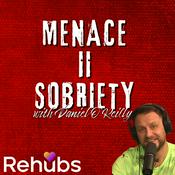354 episodes
Why High Achievers Keep Choosing Chaos While Chasing Safety (And What It Takes to Finally Feel Safe) with Jamie Carlson
11/2/2026 | 59 mins.Jamie Carlson is a business growth consultant and former corporate leader who spent her career in communications, brand, and strategic response roles at companies like Meta and PayPal. She's the person executives turned to during their messiest transitions, the calm in the storm who could hold anything. While supporting these organizations through massive change and navigating motherhood at the same time, she experienced firsthand the personal cost that comes with that version of success. Today, Jamie runs Curical Consulting, where her work is grounded in a different definition of success, helping small business owners create growth that builds capacity instead of pressure. Her perspective is shaped not just by what she's accomplished, but by what she's had to unlearn along the way.
Jamie's Story: When Safety Becomes the Cage
Jamie grew up in chaos. Military family, constant moves, raised by a young single mother who remarried multiple times. So she did what any smart, driven kid does: she decided her life would be different. She'd create the security, stability, and peace she never had growing up.
By her 20s, she was living the plan. Working multiple jobs, putting herself through Penn State after her entire family moved to Germany the week she started college, buying a condo she couldn't afford because it was the only way she could figure out how to make school work. Every decision was about one thing: never being trapped, never being dependent, never experiencing the instability that defined her childhood.
Fast forward to her 30s. Jamie's behind the scenes at Meta and PayPal during some of their most intense transitions, supporting C-suite executives through crises, holding everyone else's chaos while appearing completely calm. On the outside, incredibly impressive. Great career, beautiful family, doing all the things.
But here's what no one saw: Jamie was in chronic physical pain every single day for years. Nerve pain shooting through her neck and face, 24/7, that she just accepted as normal. She wore it like a badge of honor, actually, proof of how much she could handle. She was thriving in high-pressure environments because chaos was familiar. It's what she grew up in. The crazier things got, the more valuable she became.
And she had no idea that the thing she'd spent her whole life running from was exactly what she kept choosing.
What we talk about in this episode:
Why high achievers are addicted to chaos even while chasing peace. Jamie spent decades creating "safety" through achievement and control, only to realize she'd built a life that required constant crisis to feel normal. We unpack how the nervous system gets wired for chaos and why peace can feel more threatening than pressure when it's all you've ever known.
The physical cost of over-functioning that we ignore until our bodies force us to listen. For years, Jamie was in chronic nerve pain but saw it as proof of her strength and capacity. It wasn't until pregnancy gave her body permission to relax that she realized she'd been living in a state of constant physical crisis, normalized and ignored because she was "good at handling it."
How motherhood became the breaking point that shifted everything. When Jamie held her first baby, she experienced something she'd been chasing her entire life: she wasn't in pain. For the first time ever, her body relaxed. That moment cracked open the realization that the safety she'd been building through achievement had nothing to do with actually feeling safe.
The trap of being "the calm one" everyone depends on. Jamie built her entire identity around being the person who could hold anything, the rock everyone turned to when things fell apart. We talk about how that role becomes a prison and what it costs when your worth is tied to your capacity to carry what no one else can.
Why choosing to do nothing was scarier than any high-stakes corporate role. When Jamie got laid off from Meta, she had the financial security and support system she'd spent her life building. The scariest thing she could do wasn't find another job. It was taking six months off. We explore why rest and presence feel more threatening than pressure for high achievers.
What it actually means to stop proving and start being. Jamie's entire life was driven by proving she could make it, handle it, create it on her own. She shares the ongoing work of shifting from "can I do this hard thing?" to "do I even want to?" and what becomes available when the goal isn't the next achievement but actually feeling joy in the life you've already built.
How to tell the difference between your intuition and your brain's fear spirals. Jamie followed gut instincts that looked insane from the outside (buying a condo at 20 with no job, moving across the country to Austin after one weekend of virtual tours) but always worked out. We unpack how she's learning to trust that knowing and think less.
Why numbness is the real cost of success for high achievers. Jamie had everything she thought she wanted but couldn't feel any of it. No joy, no sadness, just this flatline of "everything's fine." She shares what it's taken to reconnect with feeling and why that's been harder than any professional challenge she's faced.
This episode is for you if you've ever:
Spent your whole life creating safety but never actually felt safe
Built something beautiful but can't seem to feel it or enjoy it
Been everyone's rock while quietly crumbling inside
Worn chronic pain or exhaustion like a badge of honor
Thrived in chaos because calm feels unfamiliar and threatening
Made every decision based on security but still feel trapped
Been the person everyone turns to when things fall apart
Wondered why you're numb despite having everything you thought you wanted
Known you should rest but literally don't know how
Achieved the external markers of success but feel nothing
How to Stop Choosing Chaos While Chasing Safety
Here's what Jamie's story reveals: the strategies that got you here, the over-functioning, the constant motion, the ability to handle anything, are the very things keeping you from what you actually want.
You spent your life becoming the strong one, the capable one, the person who doesn't need help. And now that identity is a cage. You can't stop moving because stillness feels like death. You can't ask for help because being needed is how you know you matter. You can't feel joy because your nervous system is still wired for the next crisis.
The cost isn't just the chronic pain or the exhaustion or the numbness, though those are real. The cost is that you built the safe, stable, beautiful life you always wanted, and you can't let yourself have it.
Get your free Bonus for this episode, The Safety Paradox Assessment, at lisacarpenter.ca/bonus
Ready to stop over-functioning and start actually feeling safe?
If Jamie's story hit close to home, if you're the person everyone leans on while you're running on fumes, if you've achieved everything you thought would make you feel secure but you're still waiting for the other shoe to drop, this is your pattern.
The Congruency Audit is where we look at the gap between the success you've built on the outside and what you're actually feeling on the inside. We'll identify the exact patterns keeping you stuck in over-functioning mode, the wounds driving your need to always be the strong one, and what it's going to take for you to finally stop proving and start being present in the life you've already created.
Because you didn't build all of this just to keep white-knuckling your way through it.
Book your free Congruency Audit: lisacarpenter.ca/audit
Connect with Jamie Carlson
LinkedIn: Jamie Carlson
Company: Curical Consulting
It's not either/or. It's both/and. You can honor your drive and ambition AND stop choosing chaos. You can be the capable one AND let yourself be supported. You can create safety AND actually feel it.
This isn't about optimizing the version of yourself you built to survive. It's about creating congruence so the life you've built doesn't just look good, it finally feels right.
If you listen on Spotify:
Open the Spotify app on your phone.
Search for Lisa Carpenter and open her podcast page.
Tap the three dots under the podcast description.
Choose Rate show from the menu.
Select your star rating and tap Submit.The Hidden Cost of Proving Your Worth: What Happens When Money Can't Fix What's Broken with Brandon Lucero
04/2/2026 | 59 mins.Ever wonder why hitting the million-dollar milestone didn't feel the way you thought it would? Brandon Lucero built a million-dollar business in nine months, bought the dream car, and proved to everyone he'd made it. But on the inside, he was working such long hours he wasn't seeing his kids some days, chasing significance instead of fulfillment, and walking on eggshells in his marriage to avoid rocking the boat. What he didn't realize was that his relentless drive to prove his worth was actually rooted in low self-worth, one that would take his divorce and three years of wild discomfort to finally face.
Brandon's Story: From Dead Broke to Million Dollar Business to Facing Who He Really Was
Brandon started from the bottom. Living with his in-laws with less than $1,000 in his bank account, watching his friends buy houses and build careers while he was a college dropout with nothing to show for it. Money became his measure of worthiness. If he could just become a millionaire, then he'd finally feel like he mattered.
And he did it. Brandon built his first million-dollar business in nine months. He bought the Jaguar F-Type, the dream car that was supposed to signal he'd arrived. But when he caught himself driving it to the Four Seasons and Ritz Carlton, seeking significance, trying to feel better than other people, he realized something was deeply wrong. The car wasn't the problem. His relationship with worthiness was.
Then came the real reckoning. His 25-year marriage ended. The identity of "husband and dad" that he'd wrapped his entire sense of self around got ripped away overnight. He was just Brandon. Just dad. And he had to face the parts of himself he'd been avoiding for decades: the people-pleasing, the walking on eggshells, the constant abandonment of himself to keep everyone else comfortable. The hidden signs of low self-worth that look like being the nice person, the accommodating one, the one who never rocks the boat.
Over the past three years, Brandon has been in a constant state of discomfort as every area of his life that he was comfortable with got blown up at once. His business, his relationship, his parenting, his identity, his financial security. And through it all, he's learned that the most spiritual work you can do isn't meditating for hours. It's sitting in the wild discomfort of rediscovering who you are when all your armor falls away.
What we talk about in this episode:
What it actually costs to build a million-dollar business in nine months - Working before your kids wake up and coming home after they're asleep. There was a six-month period where Brandon has no memories with his kids because he was working until he was tired. The quiet regret of wishing he'd slowed down just a little, delayed the million-dollar year, to have those memories back.
The divorce that stripped away every identity he'd built - Being with someone for 25 years since age 16. The massive attachments and dependencies. What it feels like to have your soul split in half. The identity crisis of no longer being "husband and dad," just Brandon, just dad. And having to finally look at all the ways he'd been abandoning himself.
This episode is for you if you've ever:
Worked before your kids wake up and come home after they're asleep, justifying it as building their future while a part of you knows you're missing moments you can't get back
Gone through a major life transition (divorce, career shift, identity crisis) and suddenly had to face patterns you'd been running for decades
Looked back on a period of your life and realized you have no memories because you were so consumed by work
How to stop proving your worth through achievement and start building success that actually feels good
Brandon's story reveals something most high achievers don't want to admit: the relentless drive to prove yourself is often rooted in low self-worth. Not the obvious kind where you talk negatively about yourself. The hidden kind that looks like success on the outside. Being the reliable one. The nice person. The high achiever who can handle anything. Never saying no. Never setting boundaries. Constantly bending to accommodate everyone else.
The cost of this pattern isn't just burnout. It's working such long hours you don't see your kids some days. It's having six-month periods where you have no memories because you were working until you were tired. It's relationships where you've been walking on eggshells and abandoning yourself for years. It's hitting every milestone and still feeling empty because you never actually defined what success means to you beyond the next goalpost.
When Brandon's marriage ended, he had to finally face all the ways he'd been people-pleasing and abandoning himself. The three years since have been a constant state of discomfort as every area of his life got blown up at once. But through it all, he's realized that worthiness isn't something you earn through achievement. It's something you claim by finally stopping the abandonment of yourself. By sitting in the discomfort instead of numbing it. By taking personal responsibility instead of staying in victimhood. By getting curious about who you are underneath all the armor you built to survive.
The transformation isn't about doing less or lowering your standards. It's about redefining what you're building toward. Not millions in the bank and a mansion and a Ferrari. Just being financially comfortable, doing work you love, and being hyper-present in your life. That's success. That would be enough.
Get The Hidden Cost Assessment at: lisacarpenter.ca/bonus
Ready to stop abandoning yourself in the name of success?
If Brandon's story hit close to home, if you're finally ready to stop proving your worth through achievement and start creating success that actually feels good, it's time for a conversation.
The Congruency Audit is where we look at the gap between the success you've built on the outside and what you're actually feeling on the inside. We'll identify the exact patterns keeping you stuck in people-pleasing and over-functioning, the wounds driving your need to prove yourself, and what it's going to take for you to finally create success that feels as good on the inside as it looks on the outside.
You don't have to keep working yourself into the ground. You don't have to keep having periods where you're so consumed by work you have no memories. You don't have to keep chasing significance when what you actually want is fulfillment.
Book your free Congruency Audit: lisacarpenter.ca/audit
If you listen on Spotify:
Open the Spotify app on your phone.
Search for Lisa Carpenter and open her podcast page.
Tap the three dots under the podcast description.
Choose Rate show from the menu.
Select your star rating and tap Submit.The Camino Isn't About Finding Yourself: What 100km (72 miles) of Walking Actually Reveals
28/1/2026 | 45 mins.What happens when you remove all the noise from your life and just walk?
You're good at solving problems. You're the one people call when things need to get done. But when was the last time you created space to just be with yourself without an agenda, without your phone, without the constant mental list of what needs to happen next?
Sara Intonato and I have walked the Camino de Santiago together twice. 100 kilometers (about 72 miles) each time. And in September 2026, we're doing it again, but this time we're taking 16 people with us.
This episode is Sara and me sitting down to share what actually happens on the Camino. Not the Instagram version. The real experience of what it's like to walk 15-20 kilometers a day, what comes up when you remove all the distractions, and why we keep coming back to this ancient pilgrimage route.
Why Sara and I Keep Walking the Camino
Sara has been on the podcast before (just before Christmas), and if you listened to that episode, you know she's someone who gets the deeper work. We've walked the Camino together twice, and each time something different reveals itself. Each time we're navigating different things in our lives, and the Camino gives us the space to be with them.
We both had things we were processing. Real things. And the Camino gave us the space to be with them without all the usual noise and distraction. No phones constantly buzzing. No meetings. No performance. Just walking, processing, feeling, and being honest with ourselves and each other.
That's why we're co-hosting this retreat. Because we both know what becomes possible when you create that kind of space for yourself. And after walking it together twice, we're ready to hold that space for others.
What we talk about in this episode:
Why we keep coming back to the Camino: What's different each time we walk and what this pilgrimage offers that nothing else does
What it's really like to walk 100 kilometers together: The rhythm of the days, the conversations that happen naturally, and how physical movement creates mental and emotional space
The gift of having nothing to do but walk: How removing all your usual responsibilities reveals what you've actually been carrying
Why this will be our third time but the first time we're bringing people: What shifted for us that made us ready to facilitate this experience for others
What makes this specific route special: Why we chose the Portuguese Coastal Route and what it offers that other Camino paths don't
The practical reality of the Camino: What the days actually look like, how your body adapts, what you need to know before you go
What comes up when you finally get quiet: The thoughts, feelings, and truths that surface when you stop filling every moment with noise
Why we're limiting it to 14 people: What we're creating in this group experience and why keeping the numbers small matters
How walking changes everything: Why movement is different from sitting meditation or traditional retreats, and what happens when you're in your body instead of just your head
This episode is for you if you've ever:
Known you need space to think but can't seem to create it in your regular life
Been curious about the Camino but didn't know what it's really like or if it's "for you"
Felt like you're constantly moving but never actually getting anywhere that matters
Wanted to do something physically challenging that also creates internal space
Known you're navigating something big and need distance from your regular life to process it
Felt drawn to pilgrimage or walking meditation but didn't know where to start
Been interested in the September 2026 retreat but wanted to hear the real experience before committing
Recognized that you can't think your way out of where you are right now
Craved deep conversations without the performance of regular life
Needed permission to take time away just for yourself
Why this conversation matters
We're not trying to sell you a fantasy about the Camino. Sara and I are just sharing what it's been like for us across two walks, and why we're both committed to doing it a third time with a group. The challenging parts, the beautiful parts, the moments that shifted something in us each time, and what we're creating for the people joining us.
If you've been feeling the pull toward something like this, if you know you need space to get quiet and process what's going on in your life, or if you're just curious about what happens when you remove all the noise and walk for days, this conversation will give you the real picture.
Walk the Camino with Sara and me in September 2026
We're co-hosting our third Camino de Santiago pilgrimage in September 2026, and this time we're taking 16 people with us. We're walking the Portuguese Coastal Route, the first path that's transformed both of our lives. The route that showed me what was possible when I got out of my own way, what I was holding onto, and how to let it go so I could create the life I'm living today.
This isn't a vacation. It's a walking pilgrimage where you'll cover 15-20 kilometers (about 9-12 miles) every day. You'll have time alone with your thoughts, deep conversations with the group, and coaching support from both Sara and me to help you integrate what comes up.
Registration is open now, and we're taking 16 people max. 7 spaces have already been claimed. If something inside you keeps coming back to this, there's a reason.
For retreat details and registration: lisacarpenter.ca/camino
And if you're recognizing that you need support in creating the kind of internal space the Camino offers but aren't ready for a pilgrimage, let's talk.
Book your free Congruency Audit: lisacarpenter.ca/audit
The Congruency Audit is where we look at the gap between the success you've built on the outside and what you're actually feeling on the inside. We'll identify what's keeping you stuck in the noise, what you're avoiding by staying so busy, and what it's going to take for you to finally create the space you need to hear yourself think.
Connect with Sara Intonato:
Website: https://www.saraintonato.com/
Instagram: @sara.intonato
LinkedIn: Sara Intonato
Success that feels as good on the inside as it looks on the outside.
If you listen on Spotify:
Open the Spotify app on your phone.
Search for Lisa Carpenter and open her podcast page.
Tap the three dots under the podcast description.
Choose Rate show from the menu.
Select your star rating and tap Submit.The Cost of Perfectionism: Why High Performance Demands Boundaries (Not Just Hustle) with Ciara Foy
21/1/2026 | 1h 1 mins.Why do high-achieving women struggle most with the very thing they think defines them: performance?
Ciara Foy spent years believing success meant hustle, billable hours, and proving her worth through perfectionism. She thrived in Toronto's cutthroat Bay Street legal world, worked with two assistants (one for 9-5, another for 5-midnight), and equated exhaustion with excellence. On the outside, she was crushing it. On the inside, she was crumbling under an eating disorder, control issues, and the belief that rest meant weakness.
Who is Ciara Foy?
Ciara is a Registered Holistic Nutritionist and author of "Empowered by Food," specializing in helping women over 40 thrive through perimenopause with hormone-balancing nutrition and metabolic health strategies. After leaving her high-stress Bay Street executive career to reclaim her own health, Ciara discovered that conventional diet approaches fail perimenopausal women facing the perfect storm of declining estrogen, muscle loss, and metabolic shifts. Known for her warm yet no-nonsense approach, Ciara believes that while doctors treat disease, they weren't trained in metabolic optimization or prevention.
Ciara's Story: From Perfectionism to Self-Preservation
Ciara's definition of success has been rewritten more times than most people attempt in a lifetime. From corporate law clerk billing insane hours to stay-at-home mom drowning in isolation and postpartum depression, from building two full-service weight loss clinics to navigating divorce, health breakdowns, and devastating loss, Ciara has learned that high performance without boundaries isn't performance at all. It's just slow-motion burnout dressed up as ambition.
In her 20s, success meant external validation through billable hours and perfectionism. It meant developing an eating disorder after getting fired, then proving everyone wrong by landing a role at one of Canada's top law firms. It meant saying yes to abandoning her law career dreams when her ex-husband suggested she stay home with their daughter, then feeling resentful and lost in the monotony of motherhood.
The breaking point came when pregnancy forced her to confront the eating disorder head-on. She made a deal with God: help me overcome this, and I'll devote my life to helping other women do the same. That promise launched her into holistic nutrition, where knowledge became the key that unlocked freedom from food fear and perfectionist thinking.
But the real transformation came in her 40s, when life handed her grief, loss, and circumstances that would have decimated the hustle-obsessed version of herself. When she lost her 11-month-old puppy Torrin recently, the pain was devastating. But instead of abandoning herself the way she once would have, Ciara held the line on the foundational habits that keep her whole: sleep, movement, three square meals. Not because she's superhuman, but because she's finally learned that high performance requires self-compassion, not just willpower.
Today, at 49, Ciara defines success not by how much she can do, but by the freedom to choose how she shows up. She works with high-achieving women who, like her younger self, are running on fumes and calling it ambition.
What we talk about in this episode:
Why perfectionism is really about control, not excellence – Ciara reveals how her eating disorder emerged after getting fired, and why the belief "I have to be perfect to be loved" nearly destroyed her health and relationships.
The cost of abandoning yourself for someone else's version of success – How leaving her law career dreams to become a stay-at-home mom left Ciara isolated, resentful, and 70 pounds heavier, searching for external validation she could no longer get from work.
What high performance actually requires in your 40s and 50s – Forget hustle. Ciara explains why boundaries, sleep, self-compassion, and treating your body like you treat your babies are non-negotiables for sustainable success.
How to stay in integrity with yourself when life falls apart – When devastating loss hit, Ciara didn't push through or perform her way out of grief. She held the line on foundational habits while giving herself permission to feel everything.
Why knowledge is the key to food freedom – How understanding the "why" behind nutrition gave Ciara agency over her body and broke the all-or-nothing perfectionist patterns that kept her stuck.
The difference between high performance and high hustle – Success used to mean billable hours and burning the candle at both ends. Now it means executing the things that matter at a very high level while having the courage to let everything else go.
What it means to treat your body like your baby – Ciara's powerful reframe: your body relies on you the way your children do. Would you deprive your baby of sleep, nourishment, and care? Then why are you doing it to yourself?
How to maintain muscle and metabolic health through perimenopause – Why eating three square meals during grief wasn't about willpower, it was about self-preservation and refusing to lose the strength she's worked decades to build.
Why freedom is the ultimate success metric – After chasing external validation her entire life, Ciara now measures success by one thing: the ability to choose how, when, and with whom she shows up.
This episode is for you if you've ever:
Believed that success meant hustle, billable hours, and proving your worth through exhaustion
Abandoned your own dreams or career to accommodate someone else's vision for your life
Struggled with perfectionism, control issues, or the belief that you have to be perfect to be loved
Found yourself numbing with food, scrolling, or other behaviors when the pressure became too much
Felt resentful being everyone's rock while quietly crumbling inside
Wondered if you're a high performer or just someone who's really good at running on fumes
Sacrificed sleep, movement, or basic self-care because "there's too much to do"
Lost yourself in motherhood, a relationship, or a role that looked good on the outside but felt empty inside
Struggled to eat or care for yourself during grief, stress, or major life transitions
Built impressive external success while feeling disconnected from your own body and needs
Equated rest with weakness and boundaries with selfishness
Wondered what high performance actually looks like in your 40s and 50s when hustle stops working
How to redefine high performance without burning out
Here's what most high-achieving women don't realize: the version of success you built in your 20s and 30s will absolutely destroy you in your 40s and beyond. The hustle, the perfectionism, the belief that rest is weakness – those patterns don't just stop working, they start actively harming you.
Ciara's story shows us that real high performance isn't about how much you can do. It's about how well you can execute what actually matters while protecting the foundational habits that keep you whole. It's about having boundaries that aren't negotiable, even when life gets hard. Especially when life gets hard.
Because when grief hits, when loss devastates you, when circumstances spiral beyond your control, you can't hustle your way out. You can't perfect your way through. You can only lean on the integrity you've built with yourself, the promises you've kept, the habits that hold you together when everything else falls apart.
The cost of staying stuck in hustle-mode isn't just burnout. It's losing muscle you can't easily rebuild. It's teaching your body it can't trust you. It's arriving at 50 frail, exhausted, and wondering why success feels so hollow.
Ready to stop confusing hustle with high performance?
The Congruency Audit is where we look at the gap between the success you've built on the outside and what you're actually feeling on the inside. We'll identify the exact patterns keeping you stuck in over-functioning, the wounds driving your need to be perfect, and what it's going to take for you to finally create success that feels as good on the inside as it looks on the outside.
You don't have to choose between your health and your ambition. You don't have to sacrifice sleep, strength, and presence to be successful. But you do have to redefine what high performance actually means.
Book your free Congruency Audit: lisacarpenter.ca/audit
Connect with Ciara Foy
Instagram: @ciarafoyinc
Podcast: The Empowered Feminine
Book: "Empowered by Food"
------------------------------------
Success that feels as good on the inside as it looks on the outside.
If you listen on Spotify:
Open the Spotify app on your phone.
Search for Lisa Carpenter and open her podcast page.
Tap the three dots under the podcast description.
Choose Rate show from the menu.
Select your star rating and tap Submit.Why Over-Functioning Is Keeping You Exhausted (And How to Stop Carrying What Isn't Yours) with Ichel Francis
14/1/2026 | 56 mins.Why do I feel responsible for everything and everyone?
You're successful. You've built something impressive. But you're also exhausted, overcommitted, and quietly resentful of all the responsibility you carry. On the outside, you look like you have it all together. On the inside, you're running on fumes and wondering how much longer you can keep this up.
You tell yourself this is just who you are. The responsible one. The dependable one. The one everyone turns to. But what if the weight you're carrying isn't actually yours? What if you've been taking on everyone else's problems, emotions, and responsibilities because you never learned to discern what's truly yours to hold?
Who is Ichel Francis?
Ichel Francis is a master coach and founder of The Moon Circle Movement who blends spiritual depth with business strategy in a way that's both grounded and transformative. She works through private coaching, in-person intensives, retreats, and masterminds with visionary leaders and business owners who refuse to choose between inner work and outer results. Ichel runs two successful businesses and has spent years unraveling the patterns of over-functioning, perfectionism, and unworthiness that kept her exhausted despite her success.
Ichel's Story: When Success Costs Everything
Ichel grew up in a home where her father chased material success after growing up poor, while her mother carried religious beliefs that wealth made you a bad person. Her mother worked herself to the bone, never allowing herself to enjoy what they'd built, always waiting to be worthy of receiving.
When her mother was diagnosed with terminal cancer, she had less than eight weeks to live. In those final weeks, she finally bought herself a designer purse, something she'd always wanted but never allowed herself to have. That purse sat beside her at home as she got sicker. She never used it. She'd spent her entire life waiting to be worthy, and by the time she gave herself permission, there was no time left.
That loss shattered every illusion Ichel had about working hard now to enjoy life later. It became the catalyst for completely redefining what success meant. Not material achievement. Not relentless productivity. But space, expansion, and freedom. The ability to enjoy what you're building now, not someday when you've finally done enough to deserve it.
For years after, Ichel still found herself running the same patterns. Over-functioning. Taking on everyone else's problems. Using "I don't have the bandwidth for this right now" as a get-out-of-jail-free card to avoid discomfort. Until she finally called herself out and asked: when will you have the bandwidth? At what point will you know you have enough? And she realized the answer was never, unless she chose differently.
What we talk about in this episode:
The real cost of over-functioning and why it's keeping you exhausted. Ichel breaks down how taking on everyone else's responsibilities teaches them to under-function, creating the exact dynamic you resent. When you're constantly trying to fix everyone and carry it all, you're not being helpful, you're avoiding the discomfort of letting others struggle through their own lessons.
How to discern what's actually your responsibility versus what you've taken on. Most women were taught that things that weren't their responsibility needed to be their responsibility. This pattern gets passed down generation to generation. Ichel shares how to start asking: is this even mine? And what happens when you gently place it back down and back out of the room.
The difference between surrender and avoidance (and why most high achievers confuse the two). If you're someone who runs toward pleasure and away from discomfort, you might think you're surrendering when you're actually just avoiding. Ichel explains how real surrender is sitting in the discomfort, not bouncing back to your comfortable set point, and why that's where the real growth happens.
Why "I don't have the bandwidth" became her favorite excuse to avoid responsibility. For over a year, Ichel used this phrase to get out of everything she didn't want to deal with. Problems in her relationship, issues with her kids, finances, business challenges. Until she had to ask herself: when will you have the bandwidth? The answer forced her to stop running and start sitting with what she'd been avoiding.
How to integrate intuition with structure when you're a logical, systems-oriented achiever. You don't have to choose between being strategic and being intuitive. Ichel is an INTJ who loves systems, processes, and predictability, and she's deeply intuitive. She shares how to mix creativity with structure, and why that combination creates a different level of success that most people never access.
The practice of building self-trust when you've spent years ignoring your intuition. Self-trust isn't built by making big decisions with your gut. It starts with: which shirt jumps out at you when you open your closet? What does your body actually want to eat today? Does your body want rest or does it want to move? Start there. Don't start with "should I move to a new country" intuition. Start with the shirt.
Why rigidity in any system (including lunar cycles, routines, or business strategies) will eventually blow up in your face. The universe has the last laugh when you try to control everything. Ichel thought she had life figured out with her five-year goals, ten-year plans, pristine house, perfect eating, and daily workouts. Then her mother's diagnosis blindsided her and she learned there is no control. Change is always happening. The question is: what kind of change do you want to invite?
What it means to be congruent and why it's about being yourself everywhere, not code-switching based on who's in the room. For years, Ichel was a chameleon. Corporate version. Home version. Friends version. Exhausting. Until one day she decided: I'm just going to be me everywhere. If it bothers people, I can't do this anymore. Being congruent means not apologizing for who you are and not making yourself small so others feel comfortable.
How to know when something is "enough" when you've spent years believing you have to do more to be more. Ichel's accountant asked her out of nowhere: how much money does one person actually need? She'd never asked herself the question. Most high achievers are chasing the end of a rainbow, always moving the target. Unless you define what enough looks like, you'll never feel successful no matter what you accomplish.
The one truth about success Ichel wishes she'd trusted sooner: her version doesn't have to look like anyone else's. She spent years living someone else's life, the version she thought would make people proud or prove she was okay. It led to misery. Now she knows: you get to define what success looks like. And you get to change it. The plan is to deviate. That's the beauty of it.
This episode is for you if you've ever:
Felt responsible for fixing everyone and everything around you while quietly resenting it
Told yourself "I don't have the bandwidth" to avoid dealing with hard things
Worked yourself to exhaustion trying to prove you're worthy of what you've built
Felt guilty for wanting material success or nice things for yourself
Snapped at loved ones after long days of taking care of everyone else, then felt terrible about it
Said yes to things you don't want to do because it's easier than disappointing people
Thought you needed more credentials, more validation, or more help before you could really go for it
Collapsed into bed exhausted but your mind won't stop racing about everything you're carrying
Wondered "is this all there is?" even though you've accomplished so much
Known you need to take better care of yourself but always run out of time and energy
Built a life that looks successful on the outside but feels exhausting on the inside
Been waiting to feel worthy enough to finally enjoy what you've created
How to stop over-functioning and start trusting yourself again
If you recognized yourself in Ichel's story, you're not alone. So many ambitious, capable women are drowning in responsibility they think is theirs, exhausting themselves trying to fix everyone, and quietly wondering when they'll finally get to rest.
The truth is, you're not going to rest by doing more. You're not going to feel successful by accomplishing more. And you're not going to feel worthy by working harder to prove your value.
You'll feel it when you finally stop carrying what isn't yours. When you discern between what's actually your responsibility and what you've taken on because you think being helpful means saving everyone. When you stop trying to eat for other people and let them feed themselves.
Ready to stop carrying everyone else's weight?
The Congruency Audit is where we look at the gap between the success you've built on the outside and what you're actually feeling on the inside. We'll identify the exact patterns keeping you stuck in over-functioning, the wounds driving your need to fix and control everything, and what it's going to take for you to finally create success that feels as good on the inside as it looks on the outside.
This isn't about doing more. It's about putting down what was never yours to carry in the first place.
Book your free Congruency Audit: lisacarpenter.ca/audit
Connect with Ichel Francis
Website: ichelfrancis.com
Instagram: @ichelfrancis
Podcast: The Aligned Alchemy Podcast
More Business podcasts
Trending Business podcasts
About Congruent with Lisa Carpenter | The truth beneath success. Why it never feels like enough.
You’ve built success that looks impressive on the outside, but inside, it never feels like enough. Congruent is the podcast for ambitious professionals and A-type high achievers who are tired of burning out, pushing harder, and still wondering why success doesn’t feel fulfilling.
Hosted by Master Coach Lisa Carpenter, Congruent goes beyond highlight reels and exposes the truth beneath success. With 20+ years of experience and a track record that includes thousands of coaching hours and hundreds of podcast episodes, Lisa brings the authority, depth, and honesty that ambitious leaders crave but rarely hear.
Each week you’ll hear raw interviews, live coaching conversations, and bold insights designed to help you reclaim your energy, strengthen your emotional wellbeing, redefine achievement, and step into powerful self-leadership. If you’re ready for success that finally feels as good as it looks, this is your wake-up call.
👉 Subscribe now so you never miss an episode.
Podcast websiteListen to Congruent with Lisa Carpenter | The truth beneath success. Why it never feels like enough., No Stupid Questions with Susan Edmunds and many other podcasts from around the world with the radio.net app

Get the free radio.net app
- Stations and podcasts to bookmark
- Stream via Wi-Fi or Bluetooth
- Supports Carplay & Android Auto
- Many other app features
Get the free radio.net app
- Stations and podcasts to bookmark
- Stream via Wi-Fi or Bluetooth
- Supports Carplay & Android Auto
- Many other app features


Congruent with Lisa Carpenter | The truth beneath success. Why it never feels like enough.
Scan code,
download the app,
start listening.
download the app,
start listening.





































